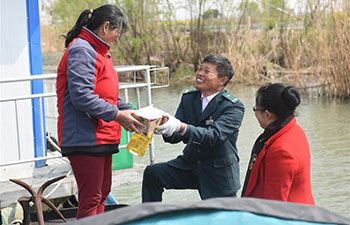by Maria Spiliopoulou
ATHENS, March 31 (Xinhua) -- People should not demonize all plastics, but can live without the throwaway ones to protect the environment and pass on a healthier planet to future generations, Greek experts told Xinhua following European parliament's vote on Wednesday to ban single use plastics within the next decade.
Single-use plastic items such as cutlery, cotton buds, straws and stirrers should be banned in the EU by 2021, while members will have to achieve a 90 percent collection target for plastic bottles by 2029, and plastic bottles will have to contain at least 25 percent of recycled content by 2025 and 30 percent by 2030, MEPs decided, according to an e-mailed press statement.
A WWF report on global plastic pollution published earlier this March verified European policy makers' concern and decision to act.
About 75 percent of produced plastics worldwide are now waste and at least 1/3 of them have polluted land and sea due to lacking waste management policies, with devastating consequences on wildlife, the international nature conservation group said.
WWF warned that without drastic changes immediately, plastic waste in the marine environment will double to 300 million tons by 2030 from current levels.
Due to its slow rate of decomposition, plastic accumulates in seas and oceans and plastic residue is found in marine species, such as sea turtles, seals and whales, but also in fish and shellfish, and therefore in the human food chain.
The solution to the crisis is collective, decisive action with no further delay and assumption of responsibility --and the environmental cost-- by all parties, from producers to the end users, WWF suggested.
"About one million tons of plastic waste is produced each year in Greece. Less than 180,000 tons is eventually recycled, while the largest part of these plastics unfortunately ends up in landfills. Although people get more educated on such issues in Greece, we still have a long way to go," Achilles Plitharas, WWF Greece Environmental Awareness officer told Xinhua regarding Greeks' performance in the management of plastics.
Plastic is flexible, durable and cheap. Disposable plastics are used on average for 10 minutes and stay in the environment for 100 years, Plitharas noted. The reduction of their use in the first place is a key target, and better waste management practices for the necessary plastics a second must.
"There is a very big problem in waste management. A very big percentage of plastic waste currently is not collected in recycling units, but ends up with no control in rivers and illegal garbage dumps. As a result, gradually the soil gets polluted or plastic finds its way to the sea and becomes a fatal threat to species like Caretta-caretta turtle or the fishes we also consume," he said regarding Greece.
"We should not demonize plastics. There is a series of applications where indeed the use of plastics has helped a lot, like in medical devices. However, there is no need to stick to the use of plastics. We can live without them and in particular those single use plastics which are unnecessary," the expert added.
In particular for Greece, WWF Greece suggests among others the creation of a separate stream for plastic waste so that more plastics can be reused and a more stringent application of the "polluter pays" principle- without loopholes, Plitharas stressed.
"For example, we have seen a very positive measure, the introduction of a levy for the plastic carrier bag, which started in 2017 with very positive results. This year we noticed that it does not progress very well, because some loopholes in the law allow the use of plastic bags," he said.
"We still have a long way to cover. The planning for the next six years is exactly to increase the percentage of people who are significantly cutting back on single use plastics," said Dimitris Politopoulos, president of the Hellenic Recycling Agency (HRA), an entity supervised by the Ministry of Environment, that designs and implements policies for the alternative management (recycling) of packaging and other products.
Greece still lags in recycling among other EU peers, according to surveys, but has made steps in recent years, has taken legislative initiatives and has paved the ground to improve its performance in coming years, he told Xinhua.
Politopoulos welcomed Wednesday's vote result as an example of the cross-border coordinated actions needed to face the crisis.
"Only the other day passed the directive for the reduction of single use plastics. We should reduce them by 2021 with various methods. In some cases there will be a ban, in others a change of material or we may establish systems where producers for example will have to pay so that these materials can be collected and not be left at the environment uncontrollably," he noted.
"We believe that in coming years there will be a radical change regarding plastic and its reduction," he stressed.
By changing the existing waste management system in Greece and introducing new sorting mechanisms HRA's chief believes that more local businesses will get involved in the recycling circle and benefit.
"In order to achieve these goals, the participation of all sides is necessary. It is not adequate when the state legislates. It is important to have all parts involved, the state, the private sector and local society along the local administration. All together through cooperation at the extent where each one can contribute, we can achieve the reduction of plastics," Politopoulos said.













